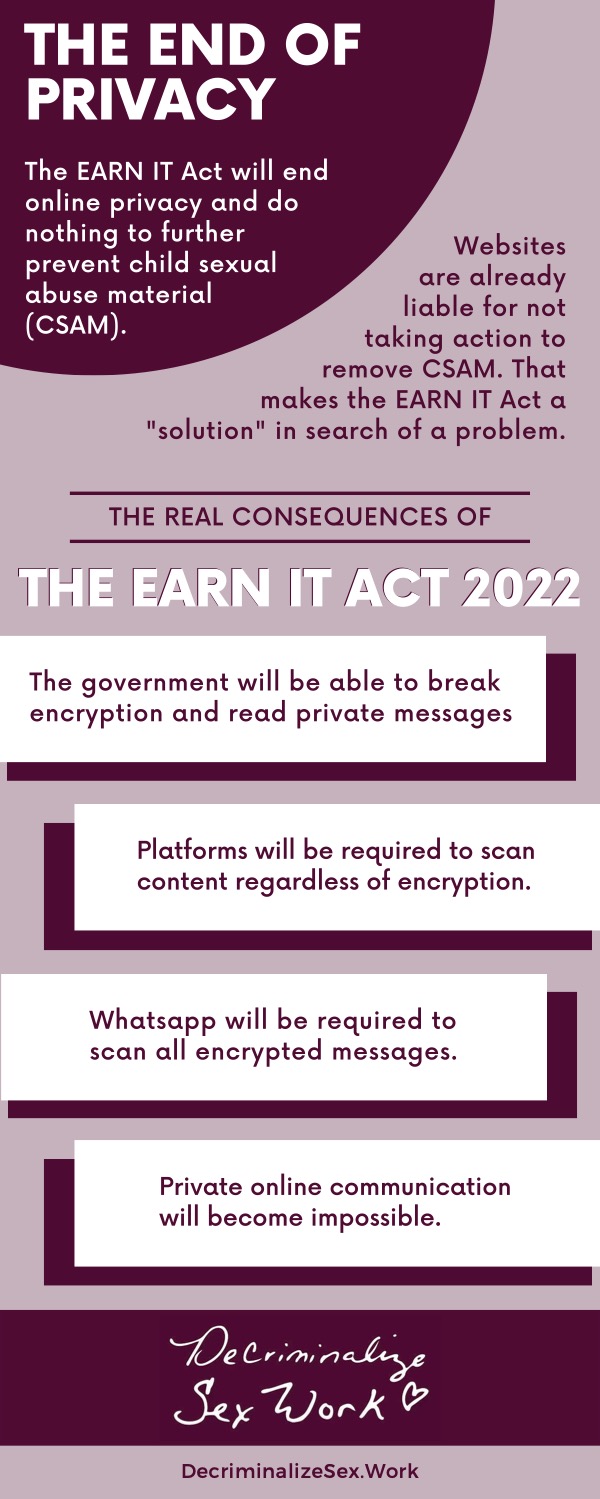What is the EARN IT Act?
The EARN IT Act of 2022 is the “Eliminating Abusive and Rampant Neglect of Interactive Technologies Act”, a federal bill purportedly aimed at eliminating the distribution of child sexual abuse material (CSAM) on the internet by amending Section 230 of the Communications Decency Act to create civil and criminal legal liability for internet platforms that do not actively search for CSAM."
Federal law already requires internet platforms to report any child sexual abuse material that they discover, but this law would force them to proactively look for it. This bill was first introduced in 2020 to serious and widespread objections, and it was reintroduced this year with even more restrictive amendments.
Table of Contents
DSW joins the Electronic Frontier Foundation, the ACLU, the Center for Democracy & Technology, and many more in opposing this legislation.
What does the EARN IT Act do?
The EARN IT Act would end online privacy and do nothing to further prevent child sexual abuse material.
-
1. The government will be able to break encryption and read private messages.
-
2. Platforms will be required to scan content regardless of encryption.
-
3. Whatsapp will be required to scan all encrypted messages.
-
4. Private online communication will become impossible.
The EARN IT Act would create liability to civil suit or criminal prosecution for internet platforms, a new regulation that endangers many users. To avoid legal issues, platforms would begin serious crackdowns on any content that could be flagged as sexual. This does not actually help stop the spread of child sexual abuse material (CSAM). It would actually remove a tool that law enforcement uses to investigate CSAM, and platforms already report countless cases of CSAM that they discover. There are constitutional issues with the bill that perpetrators could use as a defense to avoid conviction. In attempting to eliminate content that could create any risk of liability, platforms would censor unrelated content, creating disastrous consequences, particularly for already marginalized and vulnerable groups.
How does the EARN IT act impact sex workers and vulnerable groups?
Sex workers are often the biggest victims of bad legislation enacted under the guise of combatting online sexual exploitation because censorship affects their ability to earn income virtually and create online networks to vet clients and share safety tips. Loss of online-based revenue forces sex workers onto the street where they are more vulnerable to violence and trafficking, without the internet safety networks they had created. LGBTQ+ youth are also affected by censorship because they lose valuable resources that keep them safe and informed.
How does the EARN IT Act 2022 relate to SESTA/FOSTA?
The EARN IT Act is similar to SESTA/FOSTA because they both affect Section 230 of the Communications Decency Act of 1996, and each faces opposition from internet privacy advocates, sex worker rights activists, organizations that work against human trafficking and the sexual exploitation of childen, law enforcement entities, and constitutional rights experts.
Is Congress ending end-to-end encryption with the EARN IT Act 2022?
The EARN IT Act would change the law so that states can undermine end-to-end encryption (E2EE) by allowing state governments to civilly and criminally prosecute services that provide E2EE and without creating loopholes for law enforcement to read private communications. Liability threats will incentivize internet platforms to scan users’ private communications and stop offering E2EE. American citizens will lose critically important protections against privacy intrusions from the government and private industry.
What is end-to-end encryption?
End-to-end encryption (E2EE) is a digital method of transforming digital communication so that only the sender and receiver of the messages can view them. E2EE is used by journalists, government officials, the military, survivors of violence and exploitation, activists, and anyone concerned with having a private conversation that cannot be viewed by others without permission.
What does the EARN IT act do to Section 230?
If passed into law, The EARN it Act 2022 will threaten or destroy end-to-end encryption (E2EE), thereby eliminating individual privacy and increasing state.
What does Section 230 say?
Section 230 of the Communications Act (as amended, 47 U.S.C. § 230) is an important law that protects free speech and privacy by limiting online platforms from liability regarding content posted by individual users. Section 230 does not prevent federal criminal prosecution of people or organizations that knowledgably distribute child sexual abuse material (CSAM).
How are the two EARN IT bill versions different?
The EARN IT Act was first introduced in 2020, but failed to advance out of committee after fierce opposition by privacy advocates and other concerned organizations and citizens.
S.3398 - EARN IT Act of 2020
In the original 2020 version of the bill, a best practices commission would be established and adhering to its recommendations would “earn” platforms Section 230 immunity. The US Attorney General would have had significant control over the commission and its participants. In response to massive opposition, the drafters changed the bill and Senator Leahy introduced an amendment in a failed attempt to alleviate concerns that offering E2EE would lead to liability.
S.3538 - EARN IT Act of 2022
When EARN IT was reintroduced in 2022, the language was adjusted such that the encryption portion only says offering E2EE cannot be used as evidence to support other claims, as long as it will not be an “independent basis for liability.” If passed into law, the revised EARN IT Act will lay the groundwork for a massive new government and industry supported surveillance system. The most important privacy and security features in technology used by people around the globe will be eliminated
Take action! We can stop the EARN IT Act again in 2022!
Decriminalize Sex Work joins the Electronic Frontier Foundation, the ACLU, the Center for Democracy & Technology, and many more in opposing the EARN It Act. Take action and stop the EARN IT Act from becoming law by sending a letter to your elected officials now. Thank you for supporting freedom of speech and privacy, and for working to protect already vulnerable and marginalized communities.










